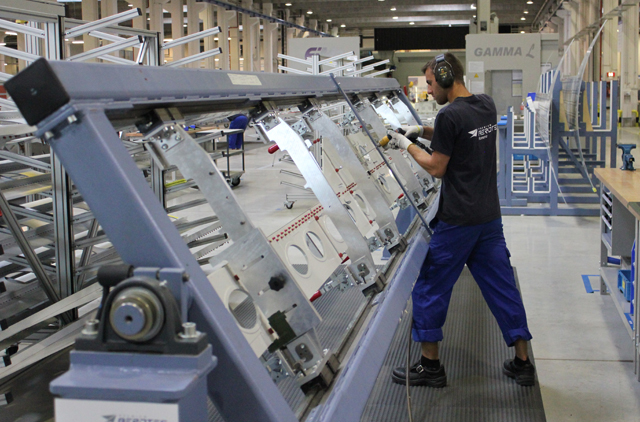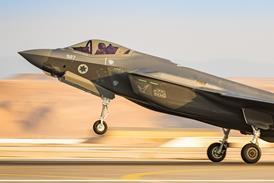Its helicopters division is not the only Airbus unit to have set up shop in Romania. In 2011, Premium Aerotec, the group’s wholly owned but autonomous aerostructures subsidiary, opened its first factory outside Germany next to the Airbus Helicopters facility in Brasov. The plant has since almost doubled in size to 26,000m2 (280,000ft2) and has just expanded its workforce from around 850 to 1,000.
Meanwhile, in a trendy tech cluster in Bucharest, Airbus Defence & Space employs just under 100 engineers, working chiefly on research and development projects for the wider business. Established in 2007 as prime contractor for a border security scheme being pitched at the Romanian government, the operation was retained when that project ended earlier this decade to preserve expertise that the business had built over that time.
While the assembly site on the outskirts of the Transylvanian city and the labs in the capital’s “Silicon Valley” are very different, they are both focused on supporting their parent organisations, with little interface with customers or the supply chain in Romania.
But that could change. Until now, the Premium Aerotec plant has been an "extended workbench". That means all its raw materials are shipped in secure consignments from the company's sites in Germany, and its output – such as the 6m-long keel beam and cargo door frame for the Airbus A320 family – delivered directly back to Germany.
However, Edmundus Rudloff, head of assembly and maintenance at Premium Aerotec Romania, hopes the business can shortly secure accreditation as a production organisation, a move that will allow it to source its own stocks, possibly from local suppliers, and introduce design engineering. "It would be an empowerment for Brasov," he says, "similar to what [Airbus sister aerostructures supplier] Stelia has done in Tunisia."
CAPACITY CONSTRAINTS
Premium Aerotec decided to set up its first overseas factory around 2009. "when it looked like we were going to run out of capacity in Germany", explains Rudloff. Thanks to Airbus's long relationship with local helicopter company IAR, it made sense to choose Brasov, a city of 300,000 people with an industrial heritage, although its biggest employer, a tractor factory, had collapsed after the fall of the communists.
There was the offer of state aid and a local university, while the presence of German speakers – Transylvania has a long-established German-speaking community – also made it an attractive location.

Aerotec
"It was a big employment boost for Brasov," says Rudloff. The company has worked with other German investors to develop a German-style technical curriculum for high school students who want to work for Premium Aerotec at 18. Today, Brasov is "one of the best performing plants for Airbus", he says. "It’s efficient and competitive with a good working culture."
At Airbus Defence & Space, managing director Flaviu Raducanu says cosmopolitan Bucharest has been a magnet for high-tech investors – Airbus's neighbours include Honeywell, IBM, Oracle and HP – drawn by the city's competitive salaries, low living costs and high numbers of IT graduates. For bright millennials, it is a "good place to be", says Raducanu. "It’s very digital, there's a dynamic atmosphere. There's a career ladder and people are enjoying themselves."
Unlike Premium Aerotec, where staff are working on a small number of large-volume parts, Raducanu's scientists and engineers are working in a virtual environment with colleagues in Toulouse, Friedrichshafen and Newport on a "vast range of projects" in areas such as networks, cyber security, command and control and spaceflight.
According to Raducanu, the Bucharest unit operates as a "small company", even though all its work is done for Airbus Defence & Space. "In many ways it is harder to sell internally than to an external market," he says. "Our focus is on delivering on time and on quality to that internal customer. Everyone knows that their job depends on what we can deliver. It keeps you fit."
The increasing integration of Airbus means Raducanu sees the possibility of work coming from the wider business. "We have expanded from doing pure security to a wider defence and space portfolio. Further growth [into working with other Airbus divisions] could come because it makes sense," he says. And, although all its €8.5 million ($10.0 million) revenue comes from "exports", Raducanu does not rule out working again for the Romanian state. "We are confident we will see more opportunities coming from Romania," he says, "and we are ready to support that."
Source: Flight International


























